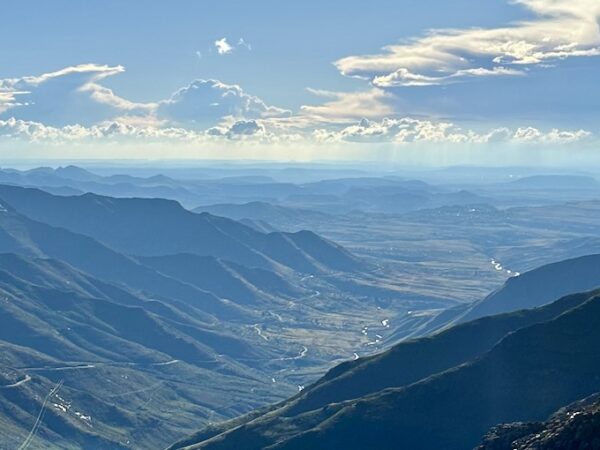Lesotho: Lesotho Highlands Water Project
-
Overview
Approximately 1,600 people from 18 communities in Mohkhotlong District, Lesotho are seeking justice for the harm caused by the construction of the Lesotho Highlands Water Project.
The Lesotho Highlands Water Project (LHWP), Africa’s largest binational water transfer scheme, is a multi-phase project between Lesotho and South Africa. Phase II involves the construction of the Polihali Dam and reservoir, requiring advanced infrastructure.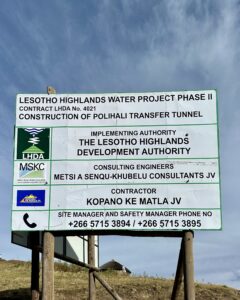
Mokhotlong District: Project signage marking the Polihali Transfer
Tunnel — a key component of the water transfer system.
(Accountability Counsel / Robi Chacha Mosenda)While the project aims to supply water to South Africa’s Gauteng Province and deliver energy and economic benefits for Lesotho, affected communities report that they have suffered forced displacement, destruction of homes, loss of livelihoods, and harm to cultural and communal land. Despite the promises of relocation, many complainants were left to endure daily blasting, pollution, and unsafe conditions near construction sites. Women, youth, and vulnerable groups are particularly affected, including through incidents of sexual exploitation and exclusion from compensation.
This phase is funded by major development banks, including the African Development Bank (AfDB), the New Development Bank (NDB), and the Development Bank of Southern Africa (DBSA). The Standard Bank, from which the Industrial Commercial Bank of China (ICBC) owns 20% equity, is acting as the advanced issuer payments and performance guarantor.
Communities in the project-demarcated area have raised concerns about the land acquisition and relocation process, citing inadequate compensation, delayed relocation, and negative impacts such as quarry blasting, sexual exploitation, pollution, and a lack of livelihood restoration.
The Lesotho Highlands Development Authority (LHDA), responsible for implementation, has been unresponsive to community concerns.
The community now seeks to file a complaint with the AfDB’s Independent Recourse Mechanism (IRM), and to advocate with the NDB and DBSA as a complementary effort to seek justice through the Banks’ financial leverage over the project.
-
The Story
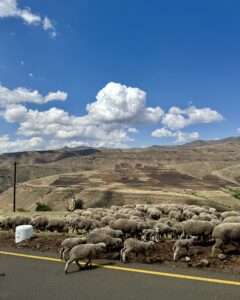
Mokhotlong District: A shepherd leads their flock through open
pastures — grazing land that may be affected by the project.
(Accountability Counsel / Robi Chacha Mosenda)The Project
The Lesotho Highlands Water Project (LHWP) was born from a 1986 treaty between Lesotho’s military government and South Africa’s apartheid regime. The agreement established a water transfer scheme, designed to divert water from the mountains of Lesotho to South Africa’s Gauteng province, which includes Johannesburg and Pretoria. In exchange, Lesotho was promised electricity generation and economic benefits from the project.
While frames as a win-win for both nations, thousands of people living in the highlands of Lesotho, especially the Mokhotlong District, have experienced displacement, loss of livelihoods, environmental damage, and cultural harm without adequate remedy or compensation.
The project has unfolded in phases:
Phase I was implemented in two sub-phases:
- Phase IA (1990-1998) involved the construction of the Katse Dam, Muela Hydropower Station, and associated tunnels and infrastructure.
- Phase IB (completed in 2004) included the Mohale Dam and further water transfer components.
Together, these phases cost approximately USD 3 billion, with financing primarily from the World Bank, the African Development Bank (AfDB), and the Development Bank of Southern Africa (DBSA).
Phase II, now underway, builds on this legacy and has raised significant community concerns. The feasibility study concluded in 2008, and the construction began in 2011 with the signing of agreements to formalize implementation.
By 2019, development of advanced infrastructure for Phase II commenced in Polihali and Katse, including roads, bridges, power infrastructure, and site preparation for the Polihali Dam and reservoir.
According to the Environmental and Social Impact Assessment report, the LHWP Phase II involves the construction of the Polihali Dam, an auxiliary saddle dam, and the Polihali Reservoir. It also includes the development of major bridges, roads, and support infrastructure, such as a new hydropower substation, telecommunications mast, and power lines.
To make way for these developments, the project requires the acquisition of approximately 5,600 hectares of land. This has profound implications for the communities residing in the area, many of whom depend on this land for grazing, farming, cultural practices, and water access. This displacement will result in great socio-economic and cultural loss for the current and future generations.
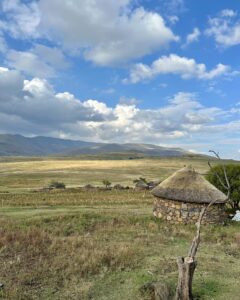
Mokhotlong District: View of one of the rural villages near the site,
earmarked for relocation. (Accountability Counsel / Robi Chacha
Mosenda)Community concerns and the impact of the project on the community
The development of advanced infrastructure under Phase II of the LHWP has had serious adverse impacts on at least 18 directly affected communities, with many more potentially at risk. These harms – environmental, social, economic, and cultural – have been widely reported and are ongoing.
Forced Displacement and Inadequate Compensation: Many households were displaced without proper notice or support, while others were never relocated despite close proximity to project activities. Compensation has often been delayed, inadequate, or issued only to male heads of households, excluding women from benefits and decision-making.
Lack of Meaningful Consultation and Participation: Communities were not properly consulted about relocation or resettlement. Decisions were made without free, prior, and informed consent, leaving communities without a say in their future.
Environmental Damage and Resource Depletion: Construction activities like blasting and road building have degraded water sources, polluted rivers, and damaged farmland – undermining food security and environmental sustainability. Construction has also displaced vulnerable and critically endangered wildlife.
Gender-Based Harm and Sexual Exploitation: Women and girls have faced increased risks of sexual exploitation, school dropouts, and exclusion from compensation. The presence of labor camps and economic stress has worsened these harms.
Labor Exploitation and Employment Injustice: The project has failed to deliver stable, safe jobs. Workers report short-term contracts, unsafe conditions, and dismissal without cause or remedy.
Lack of Transparency and Access to Information: LHDA has withheld key documents like the Resettlement Action Plan and compensation frameworks, leaving communities uninformed and disempowered.
Breakdown of Grievance Redress Mechanisms: Formal complaints have gone unanswered. The available grievance systems are inaccessible, ineffective, and leave no real avenue for justice.
Health and Safety Risks: Blasting, pollution, and poor planning have led to illnesses, injuries, and heightened risks for communities living close to construction zones.
Threats and Reprisals: Community members and human rights defenders have faced threats and intimidation when attempting to raise concerns or organize.
Financing by development banks
In March 2019, the NDB approved ZAR 3.2 billion for the Trans-Caledon Tunnel Authority. The project entity is designated as LHDA.
In June 2021, the Development Bank of Southern Africa (DBSA) announced it has closed a deal for R 5.5 billion spanning 20 years of loan facility agreements with Trans-Caledon Authority to support the implementation of Phase II of the LHWP.
In October 2021, the AfDB Board of Directors approved U.A 53,569,147.47 (ZAR 1.3 billion) for Phase II of the project. The loan was signed in October 2022, and the last disbursement date is expected to be 31 December 2027.
In March 2024, the Standard Bank announced that it is supporting the implementation of Phase II of the project. The Industrial and Commercial Bank of China has 20% equity in Standard Bank, and is currently one of the largest shareholders in the Bank. Standard Bank Group is also an Equator Principles Financial Institution.
Raising concerns with the Lesotho Highlands Development Authority and AfDB
Affected communities, with the support of Seinoli Legal Centre, have made repeated efforts to raise their concerns with the Lesotho Highlands Development Authority (LHDA), the project contractor, and the African Development Bank (AfDB) Management. These efforts have included formal letters, in-person meetings, and requests for information and redress.
Despite these attempts, communities have been met with denial, prolonged delays, and a consistent lack of meaningful engagement or commitment to resolve the issues. LHDA and the contractor have failed to adequately acknowledge the harm, address community grievances, or follow through on promises of consultation, remedy, or transparency.
Similarly, AfDB’s responses to community outreach have not yielded any tangible action or accountability for the harms experienced. This persistent lack of responsiveness has necessitated the community to escalate their concerns through the AfDB Independent Recourse Mechanism (IRM).
Complaint to the Independent Recourse Mechanism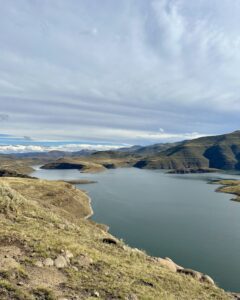
Mokhotlong District: A closer view of one of the catchments for the
project. (Accountability Counsel / Robi Chacha Mosenda)After years of raising unaddressed concerns over the social, economic, and environmental harms caused by Phase II of the LHWP, affected community representatives – supported by Accountability Counsel and Seinoli Legal Centre as advisors – formally submitted a complaint to the African Development Bank’s Independent Recourse Mechanism (IRM) on 11 September 2025. The complaint has been fully endorsed by the communities, and was developed through rigorous documentation, in-depth consultations, and direct input from affected households.
In the complaint, the communities raise the issues outlined above and demand the following (summary):
- Immediate suspension of blasting and quarrying activities until communities are fully and safely relocated, and adequate compensation is delivered.
- Full transparency and disclosure of key project documents, including compensation agreements and relocation plans.
- Dignified and inclusive resettlement, developed with meaningful community input and ensuring cultural, safety, and gender considerations.
- Fair and adequate compensation, both individual and communal, with explicit inclusion of women’s rights and entitlements.
- Livelihood restoration and provision of basic services, such as clean water, health care, education, sanitation, and infrastructure.
- Remediation of environmental harm and protection of cultural heritage sites.
- Equal employment opportunities, particularly for local residents, women, and youth, alongside improved working conditions.
- Effective grievance redress mechanisms and independent monitoring of project impacts by AfDB and LHDA.
The complaint is currently under preliminary review by the IRM.
Case Partners
Accountability Counsel is partnering on this case with Seinoli Legal Centre, a non-governmental organization that provides communities affected by large development projects with sustained, comprehensive access to the law to safeguard social, economic, and environmental rights.
Since its inception in 2010, Seinoli Legal Centre has provided innovative legal support to communities affected by the Lesotho Highlands Water Project, the extractive industry, and agribusiness.
-
The Case
-
Oct 2025
Community complaint registered by the AfDB’s IRM.
-
Oct 2025
Community complaint filed to Development Bank of South Africa (DBSA) Independent Grievance Redress Mechanism (IGRM).
-
Sep 2025
Community complaint filed to the IRM.
-
Oct 2024
Accountability Counsel and Seinoli Legal Centre signs representation agreement with 17 communities through their appointed representatives for AC and SLC to be advisers of the community through their journey of seeking remedy through filing a complaint with the AfDB’s Independent Recourse Mechanism (IRM), and advocacy with the NDB and DBSA.
-
Mar 2024
The Standard Bank announced that it is supporting the implementation of Phase II of the project. The Industrial and Commercial Bank of China has 20% equity in Standard Bank, and is currently one of the largest shareholders in the Bank. Standard Bank Group is also an Equator Principles Financial Institution.
-
Oct 2021
The AfDB Board of Directors approved U.A 53,569,147.47 (ZAR 1.3 billion) for Phase II of the Lesotho Highlands Water Project.
-
Jun 2021
The Development Bank of Southern Africa (DBSA) announced it has closed a deal for R 5.5 billion spanning 20 years of loan facility agreements with Trans-Caledon Authority to support the implementation of Phase II of the LHWP.
-
Mar 2019
NDB approved ZAR 3.2 billion for Phase II of the Lesotho Highlands Water Project.
-
Jan 2019
Construction of the advanced infrastructure components began.
-
Aug 2011
The government of Lesotho and South Africa signed an agreement to provide the legal basis for the implementation of Phase II of the Lesotho Highlands Water Project.
-
Jan 2008
The feasibility study for Phase II of the Lesotho Highlands Water Project is concluded.
-
-
Impact
The affected communities have, through their own agency and with support from SLC, raised concerns about the impacts of Phase II of the Project. These concerns were brought directly to LHDA and its contractors — through meetings, letters, site visits, and direct engagement — but were met with silence, delay, or outright denial.
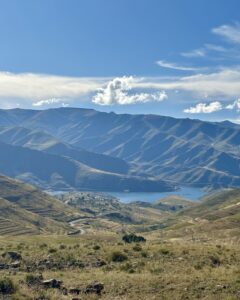
Mokhotlong District: Water catchment area linked to
the Phase II development of the LHWP. (Accountability
Counsel / Robi Chacha Mosenda)Recognizing the deepening harm and the ineffectiveness of project-level remedies, SLC reached out to Accountability Counsel to explore strategic options through international accountability mechanisms. Together, we attempted to engage AfDB Management, seeking dialogue and redress. However, that path failed to yield action.
The formal complaint to the AfDB’s Independent Recourse Mechanism (IRM) is a crucial and necessary next step. It represents a collective call for justice, transparency, and meaningful remedy from the financiers of the project.
We are committed to supporting SLC and the affected communities throughout the IRM process — ensuring their voices are heard and their demands prioritized. Beyond the IRM, we will continue to advocate for accountability from other financiers involved in the project, and stand in solidarity with the communities as they pursue the restoration of their land, livelihoods, dignity, and rights.
-
Case Media
Community members say:
“They told us we would be relocated before the blasting started. But to this day, we are still here — living with the noise, the dust, and the fear.”
“Since the construction camps arrived, we’ve seen more girls dropping out of school. They are vulnerable to men with money and promises.”
“Every time they blast, the walls in my house crack a little more. One day, they will collapse on us.”
Media Coverage
- 21 November 2025 Lesotho communities allege greenwashing by project transferring water to South Africa By Malavika Vyawahare, Mongabay
- 25 September 2025 ‘Our Land, Our Lives’: Lesotho villagers challenge Gauteng water scheme By Sheree Bega, Mail & Guardian
- 22 September 2025 Villagers lodge complaint with AfDB against Lesotho Highlands Water Project By Sechaba Mokhethi, Ground Up
- 17 September 2025 Lesotho communities file complaint over Polihali Dam project; LHDA defends implementation By Carrieann Stocks, International Water Power
- 16 September 2025 Lesotho villagers complain of damage from water project backed by African Development Bank By Rachel Savage, The Guardian
- 16 September 2025 Lesotho Highlands Water Project faces fresh opposition as communities demand accountability By Kerry Lanaghan, Biz News
- 14 September 2025 A $3 Billion Plan to Bring Water to Johannesburg Hits Snag By Antony Sguazzin, Bloomberg
- 25 March 2025 Lesotho Dam Project Sparks Backlash as Communities Demand Justice Amid Broken Promises By Roger A. Agana, News Ghana
- 5 September 2023 NDB Spotlight: The Lesotho Highlands Water Project Who Benefits? By Marianne Buenaventura Goldman, Reitumetse Nkoti Mabula
- 31 May 2023 SouthernDefenders and Seinoli Legal Centre Condemn Harassment and Intimidation of HRDs and urges Lesotho authorities to protect fundamental freedoms By Southern Defenders and Seinoli Legal Centre
- 6 February 2020 Lesotho: Polihali Dam construction puts nearly 8,000 people at risk of displacement By Amnesty International

